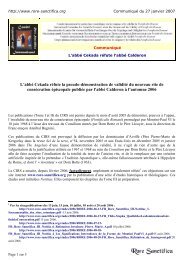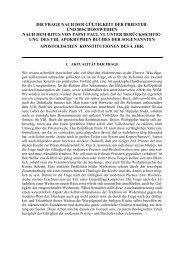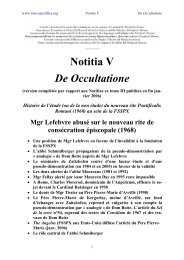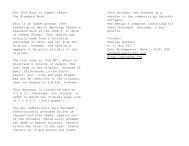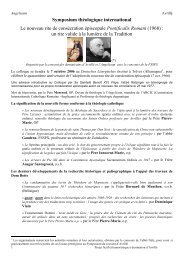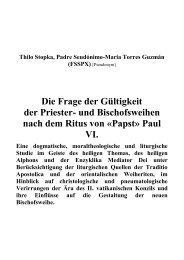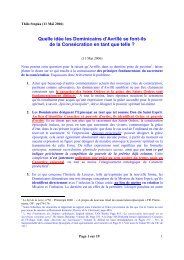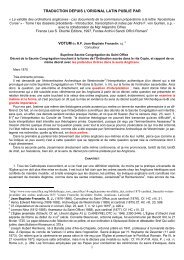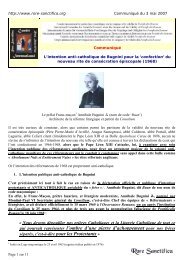THE ORDER OF MELCHISEDECH A Defence of ... - Rore Sanctifica
THE ORDER OF MELCHISEDECH A Defence of ... - Rore Sanctifica
THE ORDER OF MELCHISEDECH A Defence of ... - Rore Sanctifica
You also want an ePaper? Increase the reach of your titles
YUMPU automatically turns print PDFs into web optimized ePapers that Google loves.
clerical resistance, and practically no open resistance on the part <strong>of</strong> the bishops. Gardiner and<br />
Bonner were notable exceptions. I have described in Cranmer's Godly Order how Bishop Bonner<br />
reached the point where he realized that he<br />
must either stand up for what he believed to be true or abandon any claim to personal integrity.<br />
Eventually, on 15 September, 1549, Bishop Bonner felt that his failure to make an explicit public<br />
protest against the reforms "might unto some be an allowance <strong>of</strong> heretical doctrines". He had been<br />
forced to allow a Protestant to preach in his own Cathedral <strong>of</strong> St. Paul and when, in the sermon, the<br />
preacher declaimed "against the Holy Sacrament, denying the verity and presence <strong>of</strong> Christ's true<br />
Body and Blood to be there" the bishop rose from his place and left the Church.<br />
Four days later he explained to Cranmer "three things I have, to wit, a small portion <strong>of</strong> goods, a<br />
poor carcass and mine soul: the first two ye may take (though unjustly) to you; but as for my soul,<br />
ye get it not quia anima mea in manibus meis semper". That same night he was conveyed to the<br />
Marshalsea prison. 2<br />
The Agreed Statement on the Ministry appeared in 1973. Five years have passed since then and not<br />
a single bishop in England and Wales has had the courage to repudiate it publicly. There is no<br />
Bonner in the present-day hierarchy. And what do orthodox bishops have to fear? Not prison, but<br />
criticism in the Modernist press, the disapproval <strong>of</strong> the ecumenical establishment. I know for a fact<br />
that there are bishops who deplore the Canterbury Statement but will not criticize it publicly, since<br />
such criticism would reflect upon their two confreres who signed the document. They see<br />
themselves as members <strong>of</strong> the episcopal trade union in which loyalty to the other members, even if<br />
they are in the wrong, comes before loyalty to the Catholic Faith which, as bishops, they have a<br />
duty to defend even at the cost <strong>of</strong> their lives.<br />
The Agreed Statement on the Ministry is <strong>of</strong> particular relevance to<br />
the question <strong>of</strong> Apostolicae Curae and Anglican Orders. Its clear objective was to provide a way<br />
around Apostolicae Curae by rendering obsolete the criteria upon which Pope Leo XIII based his<br />
final and irrevocable decision that Anglican Orders are invalid.<br />
We decree that these letters and all things contained therein shall not be liable at any time to be<br />
impugned or objected to by reason <strong>of</strong> fault or any other defect whatsoever <strong>of</strong> subreption or<br />
obreption <strong>of</strong> Our intention, but are and shall be always valid and in force and shall be inviolably<br />
observed both juridically and otherwise, by all <strong>of</strong> whatsoever degree and preeminence, declaring<br />
null and void anything which, in these matters, may happen to be contrariwise attempted, whether<br />
wittingly or unwittingly, by any person whatsoever, by whatsoever authority or pretext, all things to<br />
the contrary notwithstanding (para. 40).<br />
The Agreed Statement explains (para. 17):<br />
We are fully aware <strong>of</strong> the issues raised by the judgment <strong>of</strong> the Roman Catholic Church on Anglican<br />
Orders. The development <strong>of</strong> the thinking in our two Communions regarding the nature <strong>of</strong> the<br />
Church and <strong>of</strong> the Ordained Ministry, as represented in our Statement, has, we consider, put these<br />
issues in a new context.<br />
Pope Leo XIII condemned Anglican Orders as invalid, inter alia, because Cranmer's Ordination and<br />
Communion rites clearly rejected the concept <strong>of</strong> the Mass as a sacrifice <strong>of</strong> the Body and Blood <strong>of</strong><br />
Christ, and <strong>of</strong> the priest as a man upon whom the Sacrament <strong>of</strong> Ordination had conferred powers<br />
denied to the rest <strong>of</strong> the faithful, to transform bread and wine into the Body and Blood <strong>of</strong> Christ by<br />
an immaculate blessing, and to absolve men <strong>of</strong> their sins. Furthermore, as a result <strong>of</strong> this denial, the<br />
Anglican ordination rite was devoid <strong>of</strong> the power to confer orders so that the apostolic succession<br />
was broken and the power to ordain lost to the Church <strong>of</strong> England.



